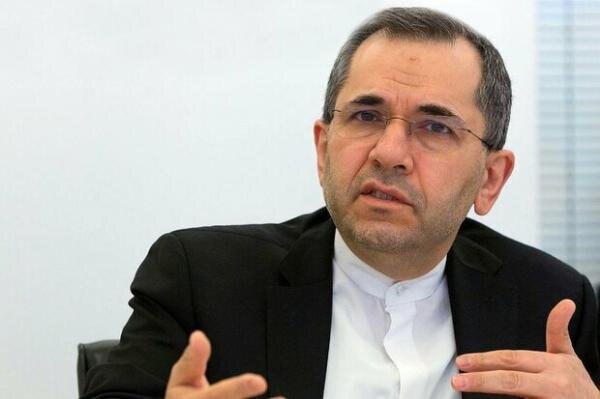Iran demands UN to condemn assassination of IRGC colonel

TEHRAN - Iran's ambassador Majid Takht Ravanchi has called on the United Nations to condemn the assassination of an Iranian IRGC colonel, saying it is part of the UN's “responsibilities to genuinely fight terrorism and in a non-discriminatory manner.”
Sayyad Khodaei, who was "cowardly" assassinated on May 23, was a member of the Iranian Armed Forces who played a key role in the struggle against terrorists, including Daesh, in the region, Ravanchi stated in his letter to the UN.
Iran’s envoy went on to say that the terrorist act, based on preliminary assessments, was “committed in continuation of systematic assassinations of innocent Iranian citizens and scientists by certain regimes to advance their illegitimate foreign policy goals in the region.”
“Such criminal acts constitute a blatant violation of the UN Charter, international law principles, and fundamental human rights, posing an undeniable threat to regional and international peace and stability,” the Iranian diplomat pointed out.
He urged the international community and the United States to denounce such vicious assassinations of innocent residents of other countries carried out by well-known state terrorism of certain regimes.
“Condemning the assassination is consistent with the UN's responsibility to combat terrorism in a non-discriminatory and effective manner,” he pointed out.
Ravanchi further stated that Iran will take all necessary steps to safeguard its people and interests, as well as use all available procedures to hold the perpetrators and supporters of this terrorist atrocity responsible.
Iran urges protection of civilians in crisis zones
Elsewhere in his remarks, Iran’s envoy urged protection of civilian lives in conflict-stricken zones across the world, especially the West Asia region.
During a UN Security Council meeting, Ravanchi said, “The protection of civilians in armed conflicts is a fundamental principle of humanitarian law.”
“However, the international community is witness to the non-compliance of international humanitarian law as well as the lack of accountability for its grave violations,” he added.
“Conflicts have had devastating effects on our volatile region, the West Asia,” the official lamented, “where international humanitarian law is being flagrantly violated.”
Ravanchi pointed to the situations in Yemen, Palestine, and Syria as examples of countries where citizens and civilian infrastructure are being violated the most in the already fragile West Asia region.
Yemen, he asserted, has been suffering from "acute food insecurity" as a result of widespread strikes on schools, hospitals, telecommunications infrastructure, roads, factories, houses, and other civilian objects.
Also, as a result of the Israeli regime's decades of occupation and apartheid policies, the humanitarian situation in Palestine is deteriorating, according to the envoy.
Meanwhile, in Syria, continued occupation, terrorism, and unilateral sanctions have displaced millions of people, devastated infrastructure, limited access to essential resources, and disrupted commerce and agricultural input supplies, he lamented.
Finally, the envoy cautioned against politicization of humanitarian aid and, among other things, called for respect for international humanitarian law in crisis zones across the world.
Leave a Comment